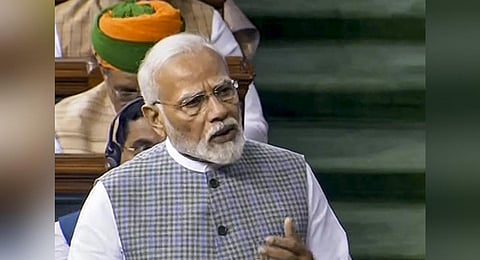

Putting an end to days-long speculation, the ruling National Democratic Alliance has tabled a landmark bill seeking to reserve 33 per cent of the seats in the national parliament for women.
"Today, women are advancing in all areas. Hence, it's essential that, in policy making also, our mothers, sisters and womenfolk give their maximum contribution, and play an important role…Today, the 19th of September, is going to become immortal for this reason," said Prime Minister Narendra Modi. The women’s reservation bill is being introduced for the seventh time in around a quarter of a century.
Perhaps anticipating some opposition from within the ruling front, Modi asked opposition parties to join him to open the doors of the new parliament house to ‘naari shakti’ or women’s power.
Not The First Time
This is not the first time that the Women's Reservation Bill has been introduced in the Indian parliament.
It was introduced in the Lok Sabha in 1996 to amend the Constitution to reserve 33% of all seats in the Lok Sabha and state legislative assemblies for women. This bill was introduced by the United Front government led by Deve Gowda.
The bill proposed to amend Articles 330 and 332 of the Constitution. It sought to reserve 181 out of 543 seats in Lok Sabha and 1,370 out of 4,109 seats in the state assemblies for women. The allocated seats would be determined by rotation - one-third of the seats would be reserved in every election.
The bill was introduced in the Lok Sabha in September 1996 and passed on September 12, 1996. However, it got stalled in the Rajya Sabha where the government lacked a majority at the time. The United Front government fell in 1997 before the bill could be passed in the Rajya Sabha.
The bill was then reintroduced in the Lok Sabha in 1998, 1999, 2008 and 2010, but did not get passed despite the support of most major national parties. The bill was referred to a Joint Parliamentary Committee in 1998 which presented its final report in 1999 with a revised draft bill. However, the government at the time did not take steps to enact the legislation.
In 2008, the bill was again introduced in the 14th Lok Sabha, where it was passed on 9th March 2010 amidst a walkout by the RJD and LJP. It was then tabled in the Rajya Sabha on 9th March 2010 by the UPA-II government led by Manmohan Singh. However, the bill lapsed after the dissolution of the 15th Lok Sabha in 2014.
The major roadblock has been the lack of consensus on the bill in the Rajya Sabha where successive governments lacked a majority. The demand for a third of the seats to be reserved for women has also been a contentious issue.
Over the years, most major national parties like Congress, BJP and the Left parties have openly supported the bill. However, there have been divisions within parties regarding modalities and extent of reservation. Some key regional parties like SP, BSP, TDP and AIADMK have also extended support at various points.
The opposition has stemmed mainly from the Samajwadi Party, RJD and JD(U). OBC leaders like Lalu Prasad Yadav and Sharad Yadav have argued that the bill only favors elite women and does not address the political representation of OBC/SC/ST women. However, some prominent OBC/Dalit women leaders like Mayawati and Meira Kumar have endorsed the bill.
While the Trinamool Congress and Biju Janata Dal also backed the bill in 2010, they suggested that the percentages be proportionate to the population of each category rather than reserving an absolute 33% seats for women.
The Lok Sabha elections in 2019 and the change in composition of the Rajya Sabha has revived hopes of the bill getting passed. The Modi government has voiced support for the bill. The Congress also appointed a panel in 2019 headed by Manish Tewari to review its stand and recommend ways to ensure early passage.